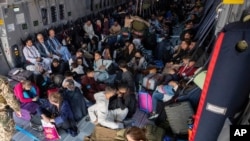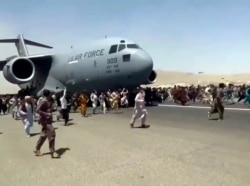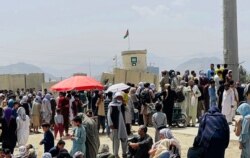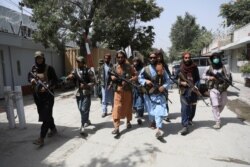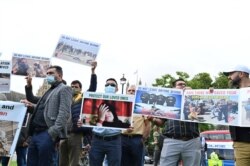The interior ministers from the Five Eyes intelligence alliance, comprising the U.S., Britain, Canada, Australia and New Zealand, held a conference call Wednesday to discuss how to coordinate safe and legal migration routes for Afghans fleeing the Taliban.
British officials said most of the focus was on the immediate security and logistical challenges of extracting Afghan officials and others, mainly civilians, who have worked with Western security forces during the 20 years of the NATO deployment in Afghanistan.
The meeting came hours after French President Emmanuel Macron promised not to abandon Afghans who had served or partnered with French forces in Afghanistan. But he added Europe needs to “anticipate and protect itself from a wave of migrants.”
“Europe alone cannot assume the consequences of the situation,” he said in a primetime televised address, which attracted criticism from rights groups and some French opposition leaders on the left. They said his remarks were at best inappropriate when juxtaposed with what is unfolding in Afghanistan, with desperate Afghans mobbing Kabul airport and clinging to the wheels of evacuation planes.
Macron was accused of pandering to the far right ahead of next year’s presidential election, where he’s expected to face a strong challenge from Marine Le Pen, leader of the anti-migrant National Rally.
“But why these words? Is this what politics has become, the tactical and icy at the same time, again and again, no matter what the distressing circumstances?” said Najat Vallaud-Belkacem, a former French minister during François Hollande’s presidency, in a Twitter post.
Canadian Prime Minister Pierre Trudeau, who also faces an election, has adopted a different tone from Macron. He has said he's “absolutely horrified” by the heartbreaking scenes coming from Kabul and vowed Sunday to continue the evacuation alongside allies.
Canada has said it will take in 20,000 Afghans, although that figure includes interpreters who worked alongside Canadian forces. Canada’s interior minister told the Five Eyes meeting that it is unlikely that the 20,000 would all be admitted in the next 12 months and the time span would be longer, British officials told VOA.
Since April, Australia has admitted 430 Afghans who worked with Australian forces, along with their families. But Prime Minister Scott Morrison said Wednesday his government expects to provide only around 3,000 visas for Afghan applicants this year. Morrison said Australia has “no clear plans” to operate a program comparable to Canada’s or Britain’s. “Australia is not going into that territory. What we're focused on is right here and right now,” he said.
Earlier in the week, Morrison admitted Australia would not be able to rescue all its former interpreters and staff that assisted in its 20-year mission in Afghanistan. New Zealand officials say they will try to evacuate Afghans who worked with New Zealand deployments and their families and have identified about 200 eligible people. But has made no public commitment about a dedicated program for other Afghan asylum-seekers.
Greece has also made clear it is not prepared to accept an influx of Afghan asylum-seekers. Notis Mitarachi, Greece’s migration minister, said his country “will not and cannot be the gateway of Europe for the refugees and migrants who could try to come to the European Union.”
“The solution needs to be common, and it needs to be a European solution,” he told state broadcaster ERT.
But there are few signs of European unity over how to deal with Afghans voting with their feet and fleeing their country, fearful of what a future of Taliban rule will hold for them. For weeks, the European Union’s national leaders, anticipating a migration crisis, have been discussing what to do, with some countries more willing to accept refugees and others making plans to deter them from arriving.
Germany has indicated it is ready to accept an unspecified number of Afghans, but Armin Laschet, seen as the most likely successor to Angela Merkel as chancellor in next month’s federal elections, has said Berlin should not repeat the mistakes of its open-door policy of 2015, which some Merkel critics argue encouraged the migration waves that buffeted Europe and roiled the continent’s politics, fueling the rise of populist nationalist parties.
Around a million asylum-seekers from the Middle East, most of them from Syria, Afghanistan and sub-Saharan Africa, settled in Europe in 2015-2016.
Asked last month at a press conference whether Germany should welcome Afghan refugees, Merkel replied: “We cannot solve all of these problems by taking everyone in.” The German chancellor backed proposals this week for Afghan refugees to be sheltered in neighboring countries, allowing time for EU countries to think about “a second step” and “whether especially affected people can be brought to Europe in a controlled way.”
Earlier in August, as the Taliban offensive unfolded, half a dozen EU countries told Brussels they wanted to continue deporting Afghan migrants whose asylum-applications were denied — despite the Taliban's recent military successes.
Germany and the Netherlands were among the group saying they wanted to continue with forced deportations, but then backtracked and announced they were suspending involuntary deportations of Afghans, joining Finland, Norway and Sweden, which announced they were halting any involuntary returns.
Britain’s interior minister, Priti Patel, who led the Five Eyes conference call Wednesday, has urged European neighbors to offer sanctuary to Afghans fleeing the Taliban. She announced Britain would grant asylum to 20,000 Afghan refugees.
Writing in the Telegraph newspaper, Patel said Britain would prioritize women and girls and religious and other minorities who face “tyranny and oppression” under Taliban rule. “The U.K. Government will always stand by those who have had the lights switched off on their liberties,” wrote Patel. She said Europe must help. “The U.K. is also doing all it can to encourage other countries to help. Not only do we want to lead by example, we cannot do this alone,” she added.
But Patel came under fire from British opposition politicians and from some lawmakers from the ruling Conservative party Wednesday for the numbers the British government is planning to accept. The 20,000 will be spread over five years, with a maximum of 5,000 resettled this year.
Patel said Britain “cannot accommodate 20,000 people all in one go.” However, critics say more Afghans should be admitted this year, otherwise they might not be alive by next year. David Davis, a former Conservative minister, said Britain has a “moral responsibility to do more” and said the British government should be thinking of welcoming “north of 50,000” refugees from Afghanistan.
Tobias Ellwood, chairman of the British parliament’s defense committee, dubbed Patel’s plan “a woefully inadequate response given the scale of the refugee crisis we are about to face as a direct response to our withdrawal from Afghanistan.” Ellwood, a former British army captain who served in Afghanistan, told local media: “The Government really needs to see the bigger picture here and grasp the scale of the crisis we created.”
The EU’s foreign policy chief, Josep Borrell, has called on the Taliban to allow safe and unhindered access for humanitarian assistance to Afghan women, men and children in need, including hundreds of thousands of internally displaced people.
“The EU calls on the Taliban to respect their obligations under international humanitarian law in all circumstances,” he said. But Borrell stopped short of making any migration pledges on behalf of the bloc. “The EU will also support Afghanistan’s neighbors in coping with negative spillovers, which are to be expected from an increasing flow of refugees and migrants,” he said.




